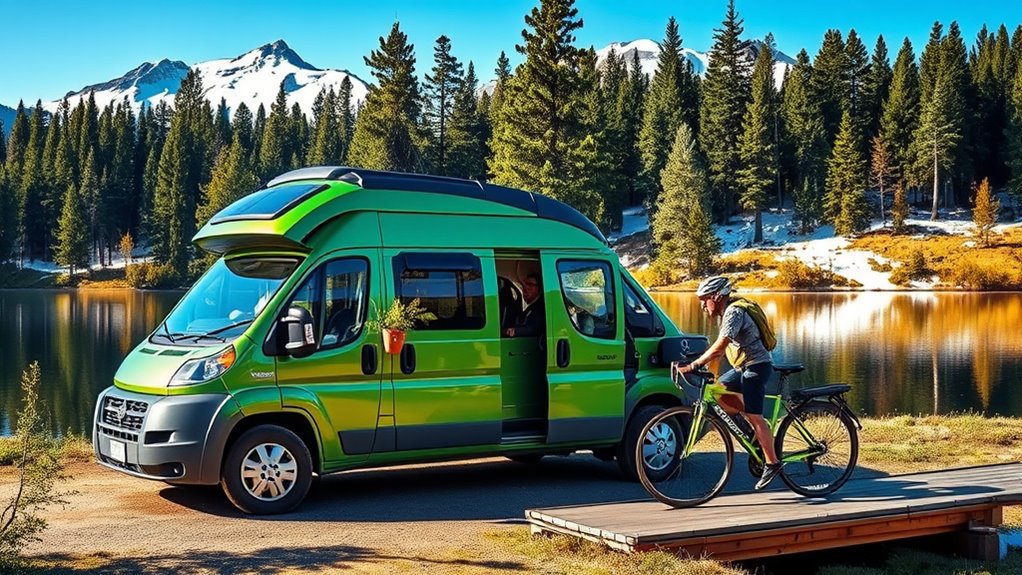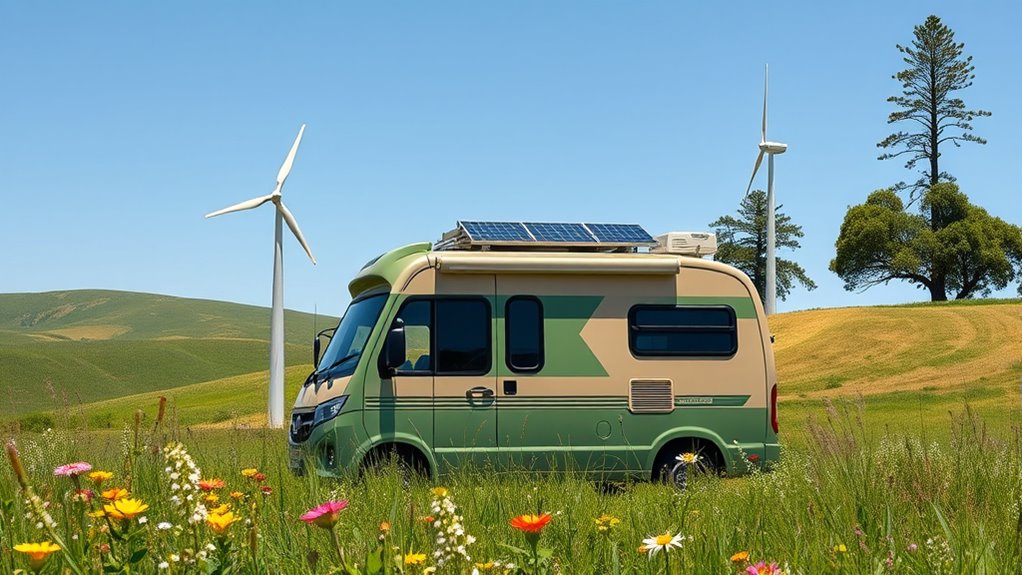To minimize your carbon footprint during campervan travels, harness renewable energy like solar panels to power your appliances and reduce reliance on fossil fuels. Practice waste reduction by using reusable items, biodegradable products, and proper waste disposal. Planning meals, buying in bulk, and composting help cut excess packaging and waste. By combining these eco-friendly strategies, you’ll protect natural landscapes and contribute to a more sustainable journey. Keep exploring to discover even more ways to travel responsibly.
Key Takeaways
- Install solar panels to generate renewable energy and reduce reliance on fossil fuels during your trip.
- Use reusable containers, biodegradable products, and practice proper waste disposal to minimize environmental impact.
- Opt for energy-efficient appliances and conserve resources to lower your overall carbon footprint.
- Plan meals carefully and reduce packaging waste through bulk buying and composting organic waste.
- Follow Leave No Trace principles and choose eco-friendly travel practices to protect natural landscapes and wildlife.

Traveling in a campervan offers a flexible way to explore nature, but it can also impact the environment if not done responsibly. To minimize your carbon footprint, adopting eco-friendly practices is essential. One of the most effective ways to do this is by harnessing solar power. Installing solar panels on your campervan allows you to generate clean, renewable energy while on the road. This reduces dependence on fossil fuels and diminishes greenhouse gas emissions. Solar power can reliably run your appliances, charge devices, and even operate small heating or cooling systems, making your travels more sustainable. By investing in high-quality solar panels and energy-efficient appliances, you can considerably cut your reliance on generators or external power sources, which often produce more pollution and noise.
Harness solar power in your campervan to generate clean energy and reduce environmental impact sustainably.
Waste reduction is another critical aspect of eco-friendly campervan travel. You should aim to minimize the amount of waste you produce by practicing responsible waste management. Use reusable containers, water bottles, and utensils instead of disposable ones. Carry eco-friendly toiletries and cleaning supplies that are biodegradable, ensuring they won’t harm the environment when disposed of. When it comes to waste disposal, always adhere to Leave No Trace principles. Use designated dump stations for grey and black water, and never dump waste in natural areas. Proper waste management not only helps preserve the beauty of the landscapes you visit but also prevents pollution that can harm wildlife and ecosystems.
Additionally, reducing waste extends to your consumption habits. Plan meals carefully to avoid excess packaging and leftovers. Buying in bulk and choosing products with minimal packaging helps reduce garbage. Composting organic waste when possible is another effective way to lower waste and create nutrient-rich soil. These small steps collectively lessen your environmental impact, making your adventure more sustainable. Incorporating spiritual decor elements like symbols or natural materials can also foster a deeper connection with the environment and enhance your mindful travel experience.
Integrating solar power and waste reduction into your travel routine is straightforward and impactful. It requires some planning and a commitment to environmentally conscious choices, but the benefits are undeniable. Not only do you help protect the natural landscapes, but you also set a positive example for fellow travelers. By making these adjustments, you turn your campervan trip into a responsible journey that respects and preserves the environment for future explorers. Ultimately, eco-friendly campervan travel isn’t just a trend; it’s a necessary shift towards more sustainable adventures. With solar power and waste reduction as your guiding principles, you can enjoy the freedom of the road while minimizing your ecological footprint.
Frequently Asked Questions
What Are the Best Eco-Friendly Campervan Brands Available?
You should consider brands like Winnebago and EarthRoamer, which prioritize eco-friendly features. These campervans often come equipped with solar panels to harness renewable energy and use biodegradable finishes to reduce environmental impact. Choosing such brands helps you travel sustainably, lowering your carbon footprint. Their innovative designs make it easier to enjoy nature responsibly while maintaining comfort and convenience on the road.
How Can I Find Eco-Friendly Camping Spots?
You can find eco-friendly camping spots by researching locations that prioritize sustainability. Look for sites with solar power to reduce reliance on fossil fuels and waste management systems that minimize environmental impact. Use apps and websites dedicated to eco-conscious travel, filtering for campsites with green certifications or eco-friendly amenities. By choosing these spots, you support sustainable tourism and enjoy nature responsibly, making your campervan trip greener and more enjoyable.
What Sustainable Materials Are Used in Campervan Construction?
You can choose campervans built with sustainable materials like recycled aluminum and bamboo paneling. Recycled aluminum reduces waste and energy use, making it an eco-friendly choice. Bamboo paneling is renewable, lightweight, and durable, helping lower your vehicle’s overall carbon footprint. Opting for these materials not only supports sustainability but also guarantees your travels are greener and more responsible. Making informed choices like these helps you minimize environmental impact on your adventures.
How Do I Offset My Campervan’s Carbon Emissions?
Remember, every little bit helps. To offset your campervan’s carbon emissions, join reputable carbon offset programs that fund renewable energy projects. You can also choose renewable energy options like solar panels for your van, reducing reliance on fossil fuels. By actively investing in these solutions, you’re not only reducing your footprint but also helping combat climate change. It’s a small step with a big impact—make it today.
Are There Government Incentives for Eco-Friendly Campervans?
Yes, you can benefit from government grants and tax incentives for eco-friendly campervans. Many governments encourage sustainable travel by offering financial support or tax breaks when you purchase or convert a campervan to electric or hybrid models. Check your local policies to see what’s available. Taking advantage of these incentives not only reduces your environmental impact but also helps you save money, making eco-friendly travel more accessible and affordable.
Conclusion
By choosing eco-friendly campervan travel, you’re gently steering your adventures toward a greener horizon. With mindful practices and sustainable choices, you can enjoy the open road while softly reducing your environmental impact. Every small step helps preserve the beauty of nature for future explorers. So, embrace these gentle shifts in your journey, and let your travels be a harmonious blend of discovery and stewardship. Together, we can keep the planet vibrant for generations to come.










